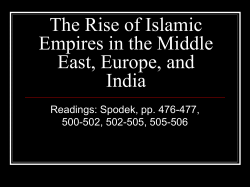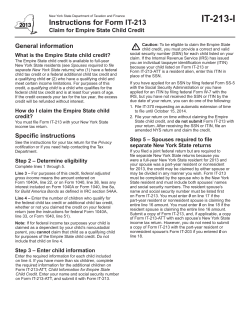
Ottoman Empire and Qing Decline The Modern Era (1750-1900)
Ottoman Empire and Qing Decline The Modern Era (1750-1900) Remember the Ottomans? Conquered Constantinople in 1453: Istanbul “Golden Age” under Suleyman Magnificent in mid 16th c. Janissaries Blend Byzantine, Arab, & Persian styles Dominate overland trade routes The Acorn . . . specifics 5.1 Industrialization and Global Capitalism Iv. There were major developments in transportation and communication including railroads, steamships, telegraphs and canals. V. The development and spread of global capitalism led to a variety of responses. C. In a small number of states, governments promoted their own state-sponsored visions of industrialization. (such as the economic reforms of Meiji Japan, the development of factories and railroads in Tsarist Russia, China’s SelfStrengthening program or Muhammad Ali’s development of a cotton textile industry in Egypt) 5.2 Imperialism and Nation-State Formation II. Imperialism influenced state formation and contraction around the world. C. Anti-imperial resistance led to the contraction of the Ottoman Empire. (such as the establishment of independent states in the Balkans, semi-independence in Egypt. French and Italian colonies in North Africa or later British influence in Egypt) 5.3 Nationalism, Revolution, and Reform III. Increasing discontent with imperial rule and the spread of Enlightenment ideas propelled reformist and revolutionary movements. F. Responses to increasingly frequent rebellions led to reforms in imperial policies. (such as the Tanzimat movement . . .) Ottoman Empire at beginning of Modern Era the Middle East and North Africa So it starts to lose territory in the ___________ century Ottoman s___________ is undermined with the C____________which were treaties granted by the Ottoman Empire conferring the privilege of extraterritorial jurisdiction within the empire on the subjects of other states, New Imperial Nation: United States • Hawaii • Spanish-American War • Monroe Doctrine • Panama Canal • Roosevelt Corollary The Monroe Doctrine is a policy of the United States introduced on December 2, 1823. It stated that further efforts by European countries to colonize land or interfere with states in the Americas would be viewed as acts of aggression requiring U.S. intervention Ottoman Decline (18th & 19th c.): the Sick Man of Europe Government corruption, ineptitude, series of assassinations Competition from European products & usurpation of trade routes by Europeans led to economic decline Intellectual stagnation Caricature from Punch magazine, dated November 28, 1896. It shows Sultan Abdul Hamid II in front of a poster which announces the reorganisation of the Ottoman Empire. The empire's value is estimated at 5 million pounds. Russia, France and England are listed as the directors of the reorganisation. The Sultan says: "BISMILLAH! [For God's sake!] Make me into a limited company? M'M AH - S'pose [I suppose] they'll allow me to join the board after allotment." The caricature refers to the weakness of the Ottoman Empire at the time. Challenges to the Ottoman Empire The West: Napoleon invaded Muslim heartland of Egypt in 1798 & quickly conquered weak Ottoman Egyptian forces. He was only expelled because of British aid/alliance. Decentralization: As the empire decayed, regional forces from within the Empire began to emerge. Inspired by Enlightenment ideas & nationalistic fervor, Christian regions of the Balkans rebelled with European encouragement & achieved independence. Muhammad Ali strengthens & separates Egypt Greek War for Independence: 1821-1832 Crimean War: 1854-1856 Otto, FR, & Brit v. Russia Origins: Russian expansionism & conflict over holy lands Used railways & telegraphs and female nurses Ended with agreement to respect Ottoman’s independence & territorial integrity --keep “The sick man of Europe” around Muhammad Ali “Father of Modern Egypt” Ottoman sultan appointed him as governor (pasha) over Egypt in 1805. Instituted lots of reforms: Land reform Tax system Euro-style bureaucracy Agricultural improvements …led to LOTS of cotton production -Egypt became one of world’s largest cotton producers Modern printing press & education systems Military reformed along Euro lines Even tried to overthrow Ottomans …but prevented by French & British --why would the French & British care/interfere??? British take over Egypt When Muhammad Ali died in 1848, Egypt was most powerful state in Mid East, but it quickly declined. Completion of Suez Canal in 1869 made Egypt of vital strategic importance to the British as a link to their colonies in India & Africa. Modernization (including the canal) was expensive & Egypt had a LOT of foreign debt. After the US Civil War when world cotton market collapsed from overproduction, Egypt couldn’t pay its international debts …. … So, Britain took control of state finances & the Suez Canal. After putting down a nationalist uprising in 1882, Britain made Egypt a protectorate. The Suez Canal gives ‘the lion’s share’ to the British with the key to India Tanzimat Reforms Increasing discontent and the spread of Enlightenment ideas propelled reformist and revolutionary movements (so says the Acorn) such as . . . . Tanzimat Reforms mid 19th century attempts to modernize the Ottoman Empire, (army, education, legal reforms) Decrees guaranteed public trials, equality before the law regardless if Muslim or not etc Inspired by Enlightenment thought encouraged Ottomanism among the diverse ethnic groups, to stem the tide of nationalist movements within the Ottoman Empire. Demise of the Ottoman Empire end of the 19th c, Ottomans remained as last independent Muslim state …but weak. Reforms were too little, too late; opposed by Religious conservatives Early 20th c, group of liberals (Young Turks) deposed autocratic ruler & instituted more reforms. But they ended up supporting Germany & Austria-Hungary in WWI, & after the war the empire was broken up & occupied by foreign powers From its ruins, a new Islamic state, the Republic of Turkey rose. The Ottoman Empire in 1914 Varied Reaction to European Domination Westernization: copy the social, political, economic, & military structure of West. Usually these reforms affected only educated elites & political change was superficial. Nationalism: which kind do you think?? Resistance: some hated Euro political & economic domination that often accompanied reform; lots of anti-Western riots & wars with European countries Islamic Fundamentalism: especially in Sudan as led by Mahdi in 1881. In a small number of states, governments promoted their own state- sponsored visions of industrialization (Economic reforms of Meiji Japan, Developments of factories and railroads in Czarist Russia, China's SelfStrengthening Movement, Muhammad Ali's development of cotton textile industry in Egypt) http://www.youtube.com/watch?v=41sPlZK WqYI http://www.youtube.com/watch?v=41sPlZKWq YI In East Asia . . . History channel on opium wars http://www.history.com/shows/mankind-thestory-of-all-of-us/videos/opium-in-china British Opium Warehouse in Patna, India Selling Patna Opium in China Opium Wars (1839-1842) China bans opium and seizes and destroys it British traders pressure for a military response to China’s anti-opium policies China loses the war: outgunned and with old technology The Treaty of Nanjing: 1842: 1st Unequal Treaty Cede Hong Kong in perpetuity Open 5 ports to trade including Canton & Shanghai $21 mil in reparations Extraterritoriality The Treaty Second Opium War: 1856 In 1856, the English and French declared war for a confiscated ship and the murder of a priest. Other Motives: More free trade Ability to travel in interior missionary activity legalization of opium China loses, again More War, More Treaties The English and French, destroy Summer Palace, win war, & retake Canton. Tianjin treaties signed Term “barbarian” was dropped in official communication Yangtze river accessible to Western ships Opium trade legalized 10 cities opened for trade and residence Foreigners right to travel, trade, and proselytize in China $ 6 mil indemnity Russia gained maritime province Dismemberment of China In this political cartoon, China is being divided up by the United Kingdom, Germany, Russia, France, and Japan
© Copyright 2025





















